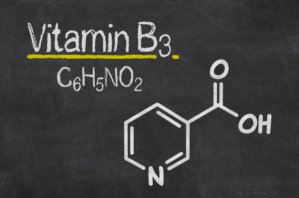Vitamin B3 variant boosts blood cell production during cancer therapy
 Swiss scientists have observed that if you take a type of vitamin B3 called nicotinamide riboside it increases the production of blood cells by improving their stem cells. This may help solve serious problems associated with anemia as a result of stem cell-based therapies that are used to treat leukemia and aggressive lymphomas.
Swiss scientists have observed that if you take a type of vitamin B3 called nicotinamide riboside it increases the production of blood cells by improving their stem cells. This may help solve serious problems associated with anemia as a result of stem cell-based therapies that are used to treat leukemia and aggressive lymphomas.
Stem cell therapies are becoming increasingly common, especially as treatment against blood cancers such as leukemia and lymphoma. In cases like these, the patient’s blood stem cells that are attacked by cancer are removed and replaced by new, healthy stem cells. However, around 25 percent of patients die because their new production of blood cells is too slow.
According to researchers from EPFL and UNIL/Ludwig Cancer Research in Switzerland, the solution to this problem could be to increase the division of so-called hematopoietic stem cells, also known as HSCs. It is these stem cells that produce red and white blood cells in the human body. The question is how to increase HSC division.
|
Nicotinamide riboside increases stem cells’ production of new blood cells
Science already knows that stress puts the brakes on HSCs. It is highly challenging for the body to reconstruct its entire blood cells system after the diseased blood cell stem cells have been removed. This type of stress causes increased activity in the cellular mitochondria, which are the powerhouses that produce energy inside the cells.
In order to meet the increased demands required to reconstruct the blood cells, the mitochondria in the HSCs increase something called oxidative phosphorylation, which is a process that makes energy in the form of ATP (adenosine triphosphate) to fuel the cells.
This enormous strain on the mitochondria, however, causes them to wear out and age prematurely.
Based on this knowledge, the team of scientists from Ludwig Cancer Research has found that a vitamin B3 variant called nicotinamide riboside is able to increase HSC activity. Their study, which also involved laboratories from EPFL’s Institute of Bioengineering and Lausanne University Hospital has enormous value for patients receiving stem cell therapy, especially as nicotinamide riboside can be taken as a supplement.
Improved HCS stem cell function and increased survival
When the researchers studied the effect of nicotinamide riboside in mouse cell cultures and human cells (in vitro), they observed an improved HCS function and saw that stressed and worn-out mitochondria were replaced by new and healthy mitochondria at a faster rate.
The scientists also exposed the mice to a type of radiation that removed their blood cells and found that the survival rate among the mice was increased by 80 percent if they were treated with nicotinamide riboside at the same time. This is because of the increased restoration of red and white blood cells.
Nicotinamide riboside has a significant ability to increase the restoration of blood
The new study shows that nicotinamide riboside significantly improves the ability of HCS to produce new blood cells and even improves the mitochondrial energy turnover in the cells. The study is the first to show that nicotinamide riboside taken as a supplement has a significant and positive effect in terms of preventing problems with blood restoration in cancer patients, even after chemotherapy and radiation therapy. The scientists expect nicotinamide riboside and other supplements that can boost stem cell health and blood formation to become part of the treatment for cancer patients, who lack blood cells. It is a very inexpensive and simple treatment with the potential to improve quality of life and save lives.
Facts about vitamin B3 and its variants
|
References:
Vitamin B3 analogue boost production of blood cells. Ecancernews. 08 Mar 2019
https://en.wikipedia.org/wiki/Vitamin_B3
https://da.wikipedia.org/wiki/Stamcelle
Search for more information...
- Created on .








